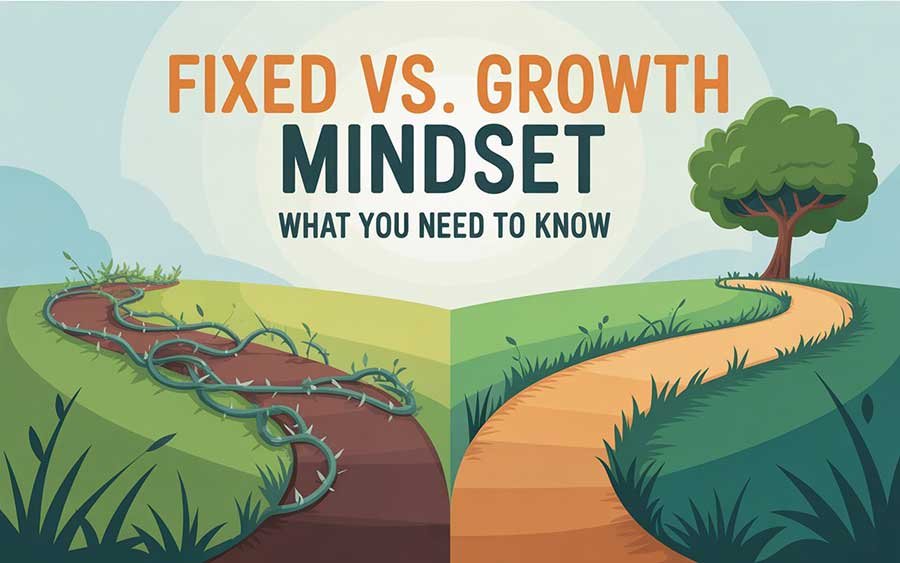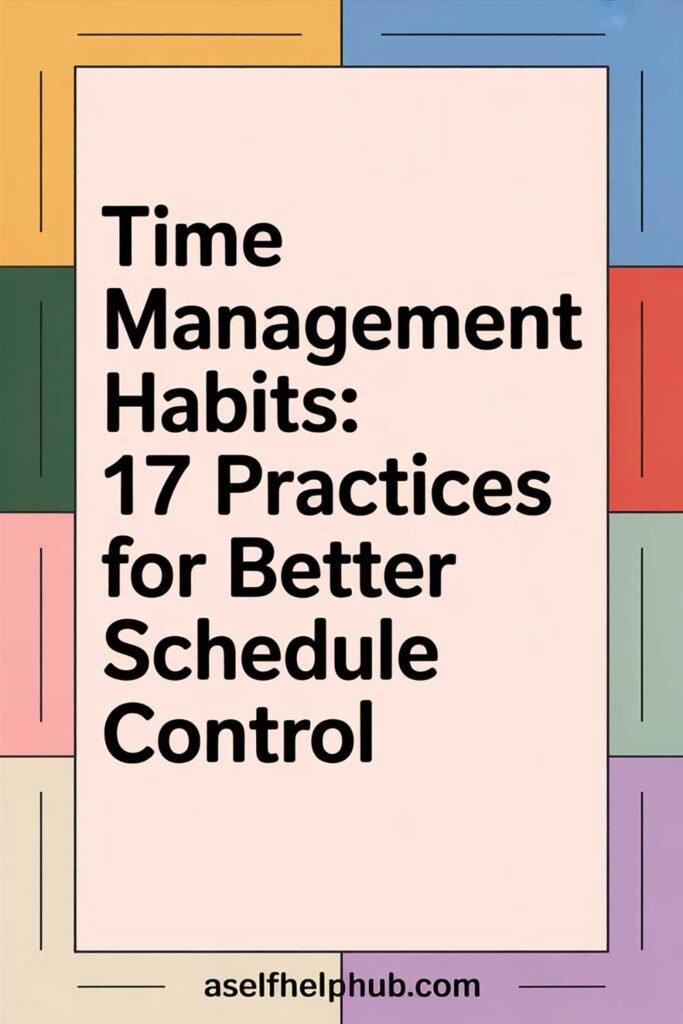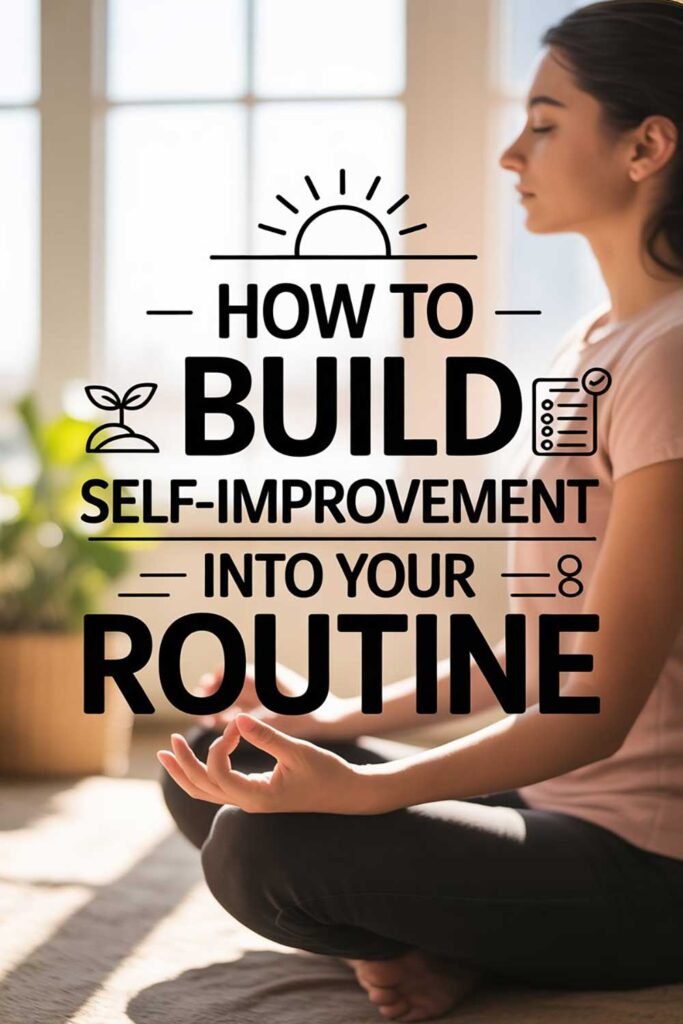
Fixed vs. Growth Mindset: What You Need to Know
Why do some people bounce back from failure while others give up completely? Why do some embrace challenges while others avoid them at all costs?
The answer often comes down to mindset.

Your mindset isn’t just how you think — it’s what you believe about yourself, your abilities, and your potential. And that belief system can either push you forward or keep you stuck. Understanding the difference between a fixed mindset and a growth mindset can unlock your ability to achieve more, learn faster, and bounce back stronger.
In this guide, we’ll break down what each mindset means, how they shape your life, real-world examples, and how to shift from fixed to growth thinking starting today.
What Is a Fixed Mindset?
A fixed mindset is the belief that your intelligence, talents, and abilities are static. People with a fixed mindset believe:
- “I am either good at something or I’m not.”
- “If I fail, it means I’m not smart.”
- “Effort is pointless if I don’t get it right the first time.”
- “Constructive criticism is a personal attack.”
This mindset limits learning, creates fear of failure, and discourages effort. It focuses more on looking smart than growing.
Real-Life Example:
Mark always believed he “wasn’t a math person.” Because of that, he avoided taking challenging courses in high school and college. He later struggled to qualify for jobs that required analytical skills, not because he couldn’t learn them, but because he never tried.
What Is a Growth Mindset?
A growth mindset is the belief that abilities and intelligence can be developed through effort, learning, and persistence. People with a growth mindset believe:
- “I can learn anything with enough practice.”
- “Mistakes help me grow.”
- “Effort is the path to mastery.”
- “Feedback helps me improve.”
This mindset leads to a love of learning, resilience, and greater achievement over time.
Real-Life Example:
Angela struggled with public speaking and froze during her first presentation. Instead of quitting, she joined a local Toastmasters club. A year later, she delivered a keynote speech at her company’s annual conference. She attributes her growth to viewing mistakes as stepping stones.
Fixed vs. Growth Mindset in Real Life
| Situation | Fixed Mindset Response | Growth Mindset Response |
|---|---|---|
| Failed a test | “I’m stupid. I can’t do this.” | “I need to study differently next time.” |
| Received criticism | “They’re attacking me.” | “This is a chance to learn and improve.” |
| Faced with a challenge | “This is too hard. I’m not cut out for it.” | “I might struggle, but I can figure it out.” |
| See someone succeed | “They’re just lucky or gifted.” | “I can learn from their success.” |
How Your Mindset Impacts Your Life
- Career: Growth-minded employees seek feedback and adapt faster, leading to promotions and satisfaction.
- Relationships: Growth thinkers view conflicts as opportunities to grow, not reasons to bail.
- Learning: Students with a growth mindset outperform those with fixed mindsets, even with lower initial scores.
- Health: Those with growth thinking are more likely to adopt healthy habits and stay consistent.
Can You Change Your Mindset?
Yes. The brain is capable of neuroplasticity — it can literally rewire itself with new thoughts and habits.
Shifting to a growth mindset takes awareness, intention, and practice, but it’s 100% possible.
Real-Life Example:
Jonathan used to avoid learning new tech because he thought, “I’m not good with computers.” After his job required using new software, he committed to 10 minutes of training videos daily. Three months later, he became the go-to person on his team for tech troubleshooting.
7 Ways to Shift Toward a Growth Mindset
- Notice your self-talk. Pay attention to negative thoughts like “I can’t” or “I’m not good at this.”
- Reframe failure. See it as feedback, not final judgment.
- Praise effort, not outcome. Whether it’s your child or yourself.
- Set learning goals, not just performance goals.
- Surround yourself with growth-minded people.
- Celebrate small wins. Progress fuels progress.
- Keep trying. Persistence builds belief.
20 Quotes About Growth, Mindset, and Learning
“Whether you think you can or you think you can’t, you’re right.” – Henry Ford
“The mind is just like a muscle — the more you exercise it, the stronger it gets.” – Unknown
“I am always doing what I cannot do yet, in order to learn how to do it.” – Vincent Van Gogh
“Success is the ability to go from failure to failure without losing your enthusiasm.” – Winston Churchill
“Failure is not the opposite of success, it’s part of success.” – Arianna Huffington
“A person who never made a mistake never tried anything new.” – Albert Einstein
“In a growth mindset, challenges are exciting rather than threatening.” – Carol Dweck
“Great works are performed not by strength but by perseverance.” – Samuel Johnson
“You miss 100% of the shots you don’t take.” – Wayne Gretzky
“It’s not that I’m so smart, it’s just that I stay with problems longer.” – Albert Einstein
“Success doesn’t come from what you do occasionally, it comes from what you do consistently.” – Marie Forleo
“Don’t wish it were easier. Wish you were better.” – Jim Rohn
“The only limit to our realization of tomorrow is our doubts of today.” – Franklin D. Roosevelt
“Do not judge me by my success, judge me by how many times I fell down and got back up again.” – Nelson Mandela
“Your mindset determines your success.” – Unknown
“Progress, not perfection.” – Unknown
“Growth begins at the end of your comfort zone.” – Neale Donald Walsch
“Be not afraid of growing slowly, be afraid only of standing still.” – Chinese Proverb
“Change your thoughts and you change your world.” – Norman Vincent Peale
“The capacity to learn is a gift; the ability to learn is a skill; the willingness to learn is a choice.” – Brian Herbert
🧠 Picture This
You approach your goals with confidence. You stop doubting your intelligence every time you make a mistake. Instead, you learn from it. Your relationships improve because you’re not afraid of tough conversations. You take on challenges at work, not because they’re easy, but because you know they’ll help you grow. Life doesn’t feel like a test — it feels like a journey.
What would your life look like if you believed you could grow in any area you chose?
📬 Please Share This Article
If this article inspired you, please share it with a friend, coworker, or on social media. Help others unlock their potential too.
⚠️ Disclaimer
This article reflects general mindset concepts and personal development practices. It is for informational purposes only. Individual results may vary.






